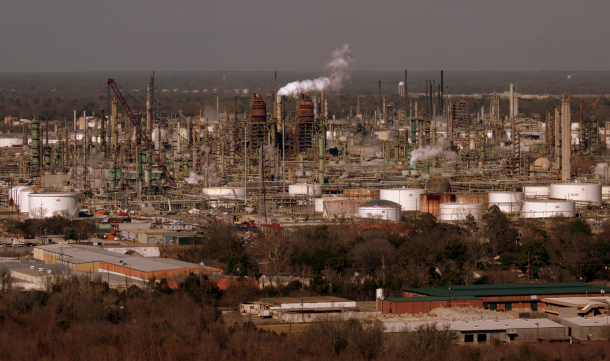Environmental Justice Denial
Air Date: Week of July 12, 2024

Cancer risk associated with emissions of chloroprene from the above Denka plant in Reserve, Louisiana was a key concern of the environmental justice groups who filed the 2022 civil rights complaint with EPA. (Photo: Lee Hedgepeth/Inside Climate News)
Black residents of Cancer Alley who live next door to polluting industrial plants say they are the victims of environmental discrimination. But their attempts to seek justice through a key provision of the Civil Rights Act are being met with racist pushback. Monique Harden of the Deep South Center for Environmental Justice joins Host Jenni Doering to discuss the ongoing attacks against environmental justice.
Transcript
DOERING: Ethylene oxide is just one of many industrial chemicals poisoning Black communities in Cancer Alley. But their attempts to seek justice are being met with pushback. In 2022 local environmental justice groups sought help from the Environmental Protection Agency under part of the Civil Rights Act known as Title VI. They said that by approving so many industrial facilities in majority Black districts, the Louisiana Department of Environmental Quality had engaged in racial discrimination. The EPA opened a civil rights investigation and hopes were high that justice would come. But then state Attorney General Jeff Landry, who is now Louisiana’s Governor, sued EPA, alleging that its bid to address longstanding environmental racism was itself a form of “reverse discrimination.” Because of that lawsuit the Department of Justice got involved, and EPA dropped its civil rights investigation in Cancer Alley, shattering the hopes of environmental justice advocates. The attacks on Title VI of the Civil Rights Act have since spread beyond Cancer Alley. And in April, Republican Attorneys General in nearly two dozen states argued EPA should no longer consider race alongside pollution risks. Monique Harden of the Deep South Center for Environmental Justice is here to discuss. Monique, welcome back to Living on Earth!
HARDEN: Thanks for having me back.
DOERING: So what is Title VI? And what does it have to do with environmental health?
HARDEN: Well, Title VI is the Civil Rights Act of the United States. It's a federal law. This is a law that was a tremendous achievement by the Civil Rights Movement, through the decades following Jim Crow, that really ushered us into a new place where we get closer to democracy and equal protection under the law in the United States. What Title VI of the Civil Rights Act of 1964 sets forth is a prohibition in the use of federal dollars by any entity that would result in the discrimination of people on the basis of race, color, national origin.
DOERING: And how has Title VI of the Civil Rights Act been used in relation to environmental justice?
HARDEN: It's been used to enforce environmental justice. What we know as, to be a fact is that many of our state environmental agencies are mostly funded with federal dollars. So that obliges each of those state agencies that are, you know, responsible for permitting pollution, monitoring it, enforcing regulations to ensure that all of their actions and activities are not discriminatory. And what we know to be a fact is that discrimination is happening across the country, where you have this, extreme disparities in communities that are disproportionately burdened with toxic pollution, and that disproportionate is based on race. So that Black people, communities are more likely than white communities to have a toxic facility operating or spewing pollution where we live. And so the state agencies, while they're looking at environmental laws, or should be, they also have an obligation, as anyone else who receives federal dollars, to look at civil rights laws and protections. And some states have been really hostile in attacking those civil rights protections, one of those states being where I live, in Louisiana.
DOERING: Right, so Monique, could you walk me through these recent challenges to the Civil Rights Act and Title VI and where they stand?

ExxonMobil’s Baton Rouge Refinery along Louisiana’s “Cancer Alley.” (Photo: Jim Bowen, Flickr CC BY 2.0)
HARDEN: Well, it goes, a little bit of history: the earliest Title VI civil rights complaint that was filed by communities seeking environmental justice was in 1989. Since then, there's been this large backlog of civil rights complaints that have been filed with the US Environmental Protection Agency. This is a federal agency that has the obligation to ensure that dollars that flow through that agency to states or localities are not used in a way that discriminates on the basis of race. And so those complaints were not being reviewed, investigated, brought to resolution by the EPA, which was and continues to be a major issue and concern for environmental justice advocates like myself and the Deep South Center for Environmental Justice. However, recently, the Environmental Protection Agency under the Biden-Harris administration accepted two civil rights complaints that were filed in St. John Parish and St. James Parish. These are communities located in Louisiana's Cancer Alley. And their complaints charged discrimination on the part of our Louisiana Department of Environmental Quality and our Louisiana Department of Health and Hospitals. EPA took both of those complaints up under one investigation, they began the work of resolving the decisions that have been a pattern of actions and decisions by each of those agencies, and got them to the table to make agreements for real transformative change that would remedy the situation. This was a document that was a near-final settlement agreement between the communities and the state agencies. One of the terms of this agreement would have required the Louisiana Department of Environmental Quality to withhold permitting for any polluting facility that would lead to racial discrimination.
DOERING: Wow, so there's almost a settlement agreement. What happens next?
HARDEN: [LAUGHS] Well, just before signatures were written on the document, our attorney general at the time for Louisiana, a man named Jeff Landry, brought a lawsuit in a jurist federal court that is far on the other side of the state away from where St. John Parish and St. James Parish are located. So he was able to find a judge who would agree and has, you know, a record of an ideology with decisions. And that really put the stops on the Department of Justice moving forward, by their decision. EPA was working within its administrative capacity to bring these civil rights complaints to resolution. Once the lawsuit was filed -- which just, you know, heinous arguments, ridiculous basis, but nonetheless, it was filed by the Attorney General of Louisiana -- the Department of Justice held back and didn't fight back against it to defend the work that EPA was doing, which is ultimately upholding Title VI of the Civil Rights Act, which was written for communities in St. John Parish and St. James Parish, Black communities facing discrimination by state governments funded by the federal government. And so that really set major disappointment within the environmental justice community, that the Department of Justice is not as serious as it should be about upholding our laws when it comes to ending racial discrimination.

Louisiana Governor Jeff Landry filed the reverse discrimination complaint that halted EPA’s civil rights investigation in Cancer Alley when he was the Attorney General of the state. (Photo: Louisiana State Attorney General’s Office, public domain)
DOERING: How do you respond to Jeff Landry's claim that it's actually racist for EPA to consider the race of impacted communities?
HARDEN: The way in which you respond is by enforcing what the law says, which is that there's a prohibition against racial discrimination, that forces analysis of racial impacts. This "colorblind" patina he wants to put on, to use as a cloak to cover actual structural racism, really has no sway with anyone. You, just taking a walk in Louisiana's Cancer Alley, it becomes really clear: Black residents in modest homes, in the shadows of towering industrial facilities, spewing toxic poison in their air and dumping it in their waterways. And so doing something about that is required by Title VI of the Civil Rights Act of 1964. It's not reverse discrimination to end racial discrimination. And the argument is specious, it holds no weight or water. But again, the Department of Justice really failed, I believe, in, you know, meeting this moment with a vigorous defense of civil rights of the residents in St. John and St. James Parish that they so deserve.
DOERING: You know, Monique, earlier in the broadcast, we heard about high levels of ethylene oxide in Cancer Alley, which of course, as you note is home to a lot of Black communities that already face a lot of industrial pollution. What do you think this weakening of Title VI that's ongoing means for communities like that?
HARDEN: It was the ethylene oxide regulations that EPA announced the spring of this year, that reduces the emissions considerably. It's a major step forward that regulatory action is still a place where change and progress can be made. But I would look at the ethylene oxide as one of many chemicals that can be released in Black and other communities of color by not just one but several industrial facilities that are all otherwise permitted to operate. And so while the reductions on ethylene oxide is important, and it shows a way for additional cuts that can be made in pollution by regulation, there's still this civil rights question that needs to be addressed, which is where is our Department of Justice, in preventing the violations of Title VI of the Civil Rights Act when it comes to toxic pollution and environmental hazards?
DOERING: You know, as I understand the challenges to Title VI have spread to many other states as well, with other attorney generals raising questions about Title VI. Why are they pursuing this weakening? And what do they have to gain from it?
HARDEN: Part of it is this political ideology that wants to do away with all racial equality in the country and stand up and bring reinforcements to white supremacy. That's part of it. Another part of it is working at the behest of large industrial polluters that are making massive profits where they're not required to clean up or reduce their pollution. And so those two dynamics are at play here with the Attorney Generals that are hostile to EPA meeting its obligation as a federal agency to prevent civil rights violations.

Monique Harden is the Director of Law and Policy and Community Engagement Program Manager at the Deep South Center for Environmental Justice. (Photo: Courtesy of Deep South Center for Environmental Justice)
DOERING: What can communities do in the face of these challenges to the Civil Rights Act, and to Title VI?
HARDEN: There's just more collective action and power building that's needed. Not as many people as you would think understand the important role that Title VI of the Civil Rights has. And so there's an education piece that's needed, of course, and with that education, informing collective action for robust enforcement of it. And so that's really our work ahead. We've got now a blueprint of what's possible that can change Cancer Alley in Louisiana. What is this blueprint? It was the near-final settlement agreement that EPA was able to develop with state agencies who didn't want the removal of federal dollars, because that's the ultimate remedy of Title VI of the Civil Rights Act. If an entity receiving federal dollars doesn't want to comply with the law, that entity is no longer funded with federal dollars. It impacts every aspect of our daily lives.
DOERING: Monique Harden is the Director of Law and Policy and Community Engagement Program Manager at the Deep South Center for Environmental Justice. Thank you so much, Monique.
HARDEN: Thank you, Jenni.
Links
Read the Louisiana Attorney General’s complaint against EPA
Learn about environmental justice and Title VI of the Civil Rights Act of 1964
Living on Earth wants to hear from you!
Living on Earth
62 Calef Highway, Suite 212
Lee, NH 03861
Telephone: 617-287-4121
E-mail: comments@loe.org
Newsletter [Click here]
Donate to Living on Earth!
Living on Earth is an independent media program and relies entirely on contributions from listeners and institutions supporting public service. Please donate now to preserve an independent environmental voice.
NewsletterLiving on Earth offers a weekly delivery of the show's rundown to your mailbox. Sign up for our newsletter today!
 Sailors For The Sea: Be the change you want to sea.
Sailors For The Sea: Be the change you want to sea.
 The Grantham Foundation for the Protection of the Environment: Committed to protecting and improving the health of the global environment.
The Grantham Foundation for the Protection of the Environment: Committed to protecting and improving the health of the global environment.
 Contribute to Living on Earth and receive, as our gift to you, an archival print of one of Mark Seth Lender's extraordinary wildlife photographs. Follow the link to see Mark's current collection of photographs.
Contribute to Living on Earth and receive, as our gift to you, an archival print of one of Mark Seth Lender's extraordinary wildlife photographs. Follow the link to see Mark's current collection of photographs.
 Buy a signed copy of Mark Seth Lender's book Smeagull the Seagull & support Living on Earth
Buy a signed copy of Mark Seth Lender's book Smeagull the Seagull & support Living on Earth

